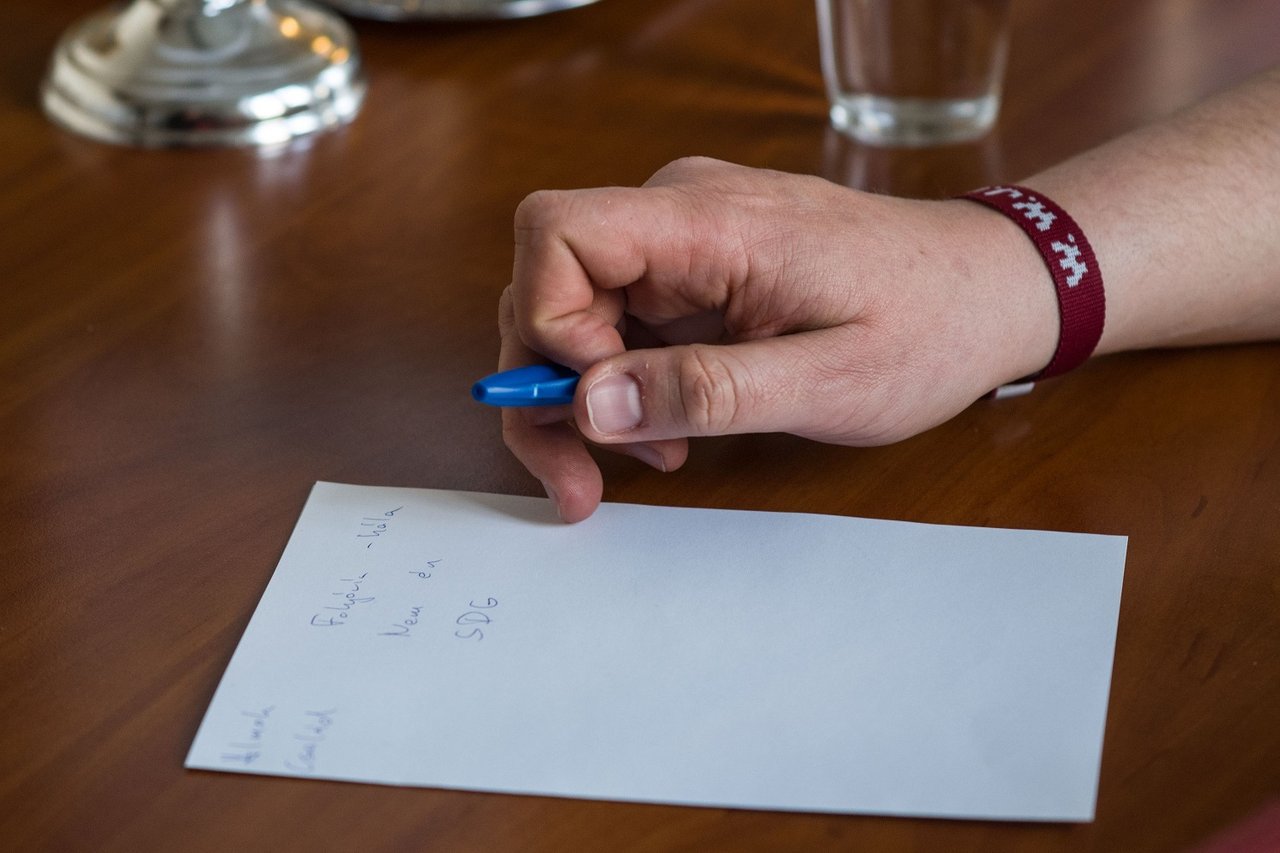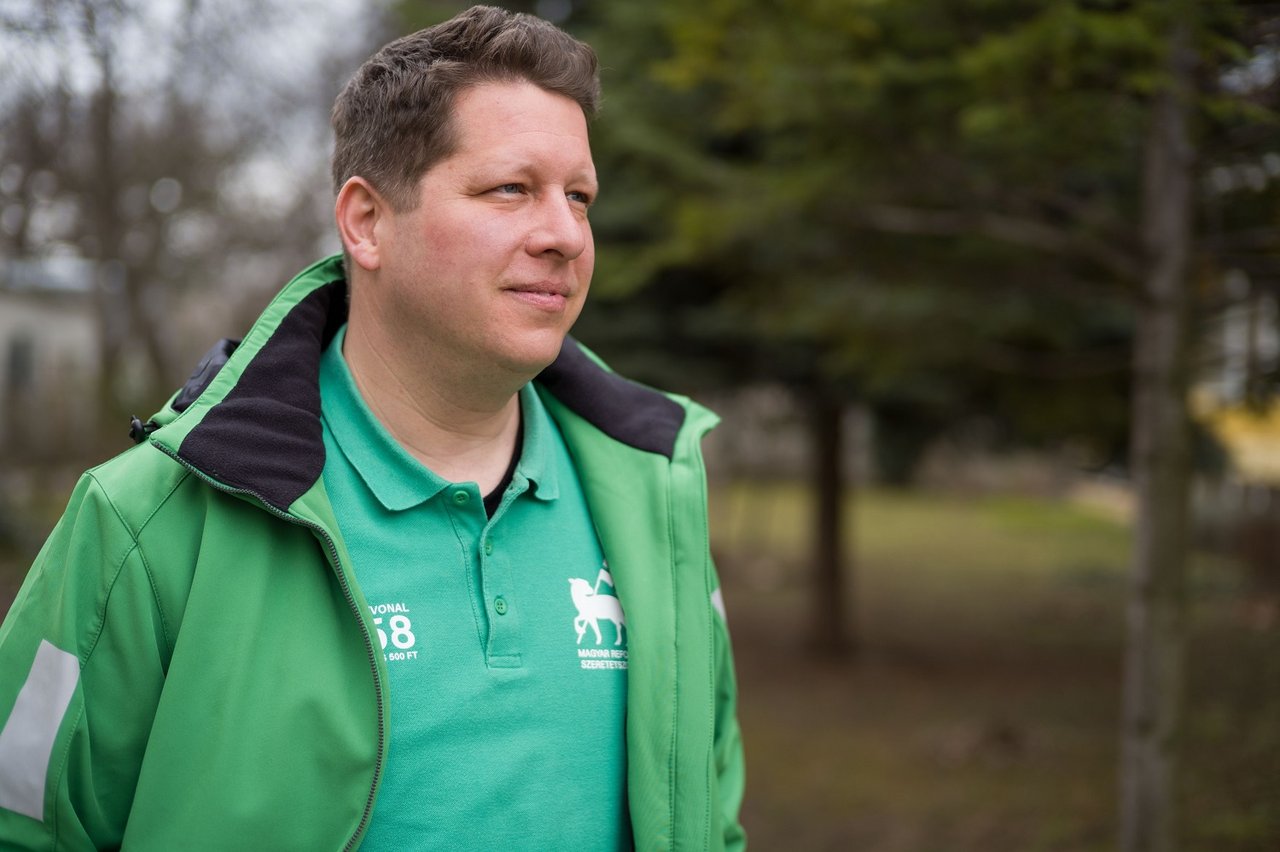While news reports of the recent earthquake show images of ruins and living people, the dead are only reported as statistics. Many remain missing forever, and the bodies of others were pulled from the wreckage by search and rescue teams. The search and rescue team of the Hungarian Reformed Church Aid (HRCA) helped to rescue five survivors after the February 6 earthquake in Turkey. Márton Juhász, the operational leader of the team and Executive Director of the HRCA, is thankful that the team was able to rescue the living and even honor the dead by recovering their bodies from the wreckage.
We greet the director at work in the office. He welcomes us warmly, and although he says he has been busy lately, he is happy to give interviews to the Reformed press. Dictaphone on, we make eye contact. There is no indication of what the operational leader of the search-and-rescue team went through in Turkey with his team members. Only his hand, almost trembling as he grips the pen, gives a hint of what might be beyond words.
Seven of the charity's team were the first to go to Hatay, the area worst hit by the earthquake: three search dogs, internationally certified team members, two professional and two volunteer firefighters. They were later joined by a twelve-member delegation and another dog as reinforcements.
According to the Executive Director, a thousand times as many search and rescue teams, equipment and dogs would have been too few. "In the first few days we mostly went to places where the authorities had directed us. We sometimes had to deviate from these as well, as people kept coming to us and begging us to help: someone is here', 'we heard something over there', 'we heard a sign of life a few hours ago'. It was difficult to remain focused on the specific area to be searched. Sometimes we had to say no to requests in other locations, but if we were really pressed, the canine searchers responded. One difficulty we encountered was that the dogs' noses became tired in just an hour or an hour and a half. They work so intensively that they need to rest, otherwise they get confused and can't do the job they've been trained to do since they were puppies," said Márton Juhász.

"As is usual in emergency situations, the team was tense. As a volunteer firefighter, I was swept up by the urgency and severity of the crisis. I wanted us to get to work immediately and stay as long as we could. The professional firefighters, on the other hand, stressed that there was no point in burning ourselves out in two days and then not being able to help, or making a mistake that would leave us needing help ourselves. I soon realized they were right. We saw video footage of a Mexican rescue team buried under the rubble that had fallen from a building," said the executive director. There was also the risk that in the aftermath of the collapse of a large building, construction machinery often started clearing the rubble in parallel with the search and rescue team’s efforts.
The team checked new areas every day, working together with the Turkish authorities and disaster management experts.
Márton Juhász stressed that in Eastern culture there is a greater respect for the dead than in Europe, and more attention is paid to finding them. “A person’s foot got stuck under the rubble. The person was no longer alive, but rescuers tried for hours to free the body intact. Maybe it would have been better to amputate and continue the rescue, but they decided otherwise," he recalls.
"On my way to Antakya I was afraid of the sight of so many dead and grieving people. I prayed that all this would not shock our team to the point of hindering our mission. God listened to my prayer. Everyone in the team kept their focus. At times we were shaken by what we had seen and experienced, but we kept working. On one occasion one of the interpreters had a breakdown after a difficult situation, and we had to take over all his tasks, so it was very important to focus exclusively on the rescue mission," emphasized Márton Juhász.
"After midnight on Friday night, suddenly the soldiers in our camp were running around blowing whistles and shouting. We thought the camp was on fire, or another earthquake was expected, or maybe there were some riots. Then the search-and-rescue teams started running around in a frenzy. I was shouting for someone to tell me in English what was happening because we couldn't understand. "A dam has burst, there is a flood." Quickly we jumped into our shoes, grabbed our coats and passports and set off. After a few minutes, it turned out to be a false alarm, but the rumor had spread all over the city. The next day, we were called to a place where, as it turned out later, a couple had already been located under the rubble with the use of a thermal camera, but the rescue team working to free them had fled the scene on hearing the false alarm about the flood. When we reached the scene, our dogs signaled that they had re- located the couple, and we re-started the search along with a Turkish rescue team. We later learned as our helicopter was leaving for the airport that they had completed the rescue of the two survivors," he shared.

"...to God alone be the glory"
"The hard part of coming to terms with what happened there has only just begun. I have not yet been able to fully process it. In general there has been an amazing, almost overflowing interest and respect for the team. Some have gone so far as to call us heroes. The city of Debrecen has honored the team. Katalin Novák, President of Hungary, thanked us for our service on behalf of the nation. We have received various media inquiries, recognition from friends, acquaintances and relatives. One might be tempted to think a little more of yourself than one should. We went out to serve, and I wouldn't say we are heroes, just that with our talent, tools, expertise and money, we did what we were called to do. We had a duty. As Paul writes in Romans 15:1: "We who are strong ought to bear with the failings of the weak and not to please ourselves." This is the spirit in which I went, and I do not want to depart from it. We are not the heroes here, the glory belongs to God alone," acknowledged the executive director of the HRCA.
In the future, the search and rescue team of the HRCA plans to expand to sixty people. They would like to develop their activities to a professional level. "We took photos of the equipment of other teams. The Koreans were equipped with professional equipment. We would like to get sonar, fiber optics and thermal imaging cameras. We will start fund-raising for this. We would like to form a team of doctors, medical staff, technicians, security technicians, and professional and volunteer firefighters. We would organize training and education for them," explains Márton Juhász. He explains the need for sixty team members by saying that in the event of a similar tragedy in the future, it is important to be able to send a group of twenty on the first day. "I hope that we will never have to use these tools, and that they will sit on a shelf gathering dust, but if they are needed, the charity service will have them ready. So far, the HRCA has delivered 4 tons of donations worth 15 million HUF (roughly $45,000). This aid has consisted of non-perishable food, clothing and hygiene and cleaning products. Hundreds of thousands of people have lost their homes, so tents, generators, heating panels, food, medical supplies and hygiene products are still needed. We will focus more on Syria in our ongoing fundraising campaign," says Márton Juhász, adding that "there are more than just the five people our team rescued to be grateful for. We have shown solidarity with the Turkish people.And it may seem strange, but we are also grateful for the fact that we rescued the dead. As we returned to civilization, we realized that even the river water has value. There is heat, there's electricity. Out there, there was nothing."